Clause Dangerous to Maui’s Sugar Industry Rejected by US Senate
By Dave Smith
The US Senate has rejected a measure that would have likely killed off Maui’s sole remaining sugar plantation and crippled the nation’s sugar producers.
Both of Hawaii’s senators voted against the amendment to the 2013 Farm Bill.
Hawaii lawmakers said the measure would have removed protections for American sugar workers and flooded the market with cheap, foreign sugar, threatening an estimated 142,000 sugar producer jobs nationwide.
The bipartisan amendment, which failed to pass the Senate in a 45-54 vote, would have removed a number of measures that leveled the playing field for American sugar producers who must compete against foreign sugar industries, like those in Brazil and Mexico, which are subsidized by their governments, Sen. Mazie Hirono said.
A similar attempt to remove the protections contained in the 2008 Farm Bill was rejected last year by the Senate.
“This amendment was a raw deal for Hawaii and sugar producers across the country,” Hirono said in a statement issued today.
“Much is said about supporting ‘made in America’ products, and this measure does the opposite,” she said. “It would have virtually zeroed out American sugar producers and forced us to depend on heavily subsidized foreign producers for this important commodity.”
Sen. Brian Schatz said Hawaiian Commercial & Sugar Co. is critical to Maui’s workforce and economy.
“HC&S provides $56 million in wages to 800 Maui residents that have served as a cornerstone of this company and community for decades,” Schatz said in a statement. “I thank my Senate colleagues for helping save jobs in Hawaii and protecting nearly $250 million in revenue that is produced by the company.”
Critics of the US sugar policy say that its price supports and import restrictions drive the price of sugar in the US to roughly twice that of the world market. The result, they say, is higher costs for domestic food producers and consumers.
While sugar was a mainstay of Hawaii’s economy for more than a century – at its peak in 1931 Hawaii’s sugar plantations employed more than 50,000 workers – HC&S is the state’s last remaining plantation.
According to the 2011 Hawaii Data Book, the company has 34,500 acres in sugar and employs a total of 800 workers on its sugar and pineapple operations (the numbers are combined for proprietary reasons).
For a viewpoint and background into the sugar industry, see our previous article: ANALYSIS: The Sugar Industry’s Bitter Reality.







_1768613517521.webp)







